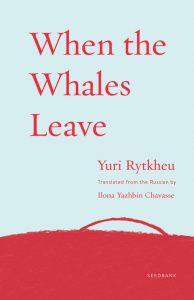Book Review
To readers unfamiliar with the geography, it might feel like the edge of the world, that place where our maps used to jump from margin to opposite margin—across the Bering Strait and beyond the northern Russian snowscapes to the Chukchi Sea. The indigenous Chukchi people still live there to this day, many of whom descended from nomadic hunters and gatherers. Author Yuri Rytkheu was born in 1930 in the small town of Uelen, a snowed-in haven located off the coast of these waters, nearly sixty miles across the ocean to the edge of Alaska. In reviewing maps and photographs of this region, one is struck by an ineffable feeling of impossibility—not only does the landscape feel frighteningly inhospitable, it also feels nearly faded to obscurity. In modern memory, weren’t these continents always just barely-touching, like God and Adam in the Sistine Chapel? Now they feel an ocean apart, growing further separated in the face of rising tides.
But somehow, from this precipice emerges a new beginning. In When the Whales Leave, Rytkheu crafts a shamanistic, Chukchi origin story of man and beast, a tale that aims to pour life from the unlikeliest of landscapes. Told in three sections, Rytkheu effortlessly conjures a multigenerational, ecological mythology about love, humanity and the creation of the biosphere. Originally written in 1975, the novella begins with a surreal scene “when Great Love came to the lonely beach to unite a whale and a human.” Nau, a resident of the Shingled Spit, falls in love with Reu, a whale who has shape-shifted into the form of a man. Their unlikely union creates the world’s ecosystem as we know it, a delicate harmony between man and animal. In dreamy prose, Nau gives birth to a pod of whales. “All the humans who live by the shore,” Rytkheu writes, “are descended from whales transformed by love.”
Generations pass, and Nau reappears in the novella’s second and third sections as a mysteriously ageless village elder. The ever-growing community of The Shingled Spit has developed a network of traditions surrounding her passed-down stories, many of which grapple with the whale’s migratory patterns. In a series of short parables that feel akin to episodes of the Old Testament, a hunter’s faith is tested, new regions beyond the clouds are explored, and lessons are learned. “Beauty lies in that which is beside you,” Nau wisely explains after a hunting party returns. “And so the whales always return when the ice retreats, because these shores are their home, just as they are ours.”
But some have started to grow skeptical and increasingly selfish. “Say that you believed the story of the whale turning into a man,” one character ponders, “why had the things that happened so long ago never happened again?” Nau’s health begins to wither in tandem with the rise of nonbelievers, and by the end of When the Whales Leave she is dangerously frail. “Something had changed in nature, and no one could explain it,” Rytkheu writes at his fable’s close, “except old Nau, who insisted it was all to do with human greed and foolishness, with people’s lack of respect for one another, for nature, and for all the other living creatures on sea and land.”
Early in the novella, Rytkheu writes that a “legend could be said to be a truth that people had ceased to believe in.” The story is riddled with similarly potent lines, all of which can be independently pondered and applied to religious and philosophical conundrums that exist outside of Rytkheu’s story. Beyond its environmentalist slant, When the Whales Leave is broadly about the loss of faith and how we might restore that fading worldview. And the faith in When the Whales Leave is specifically a faith in the world around us, and not one directed at some incomprehensible, ominous “other.” Nau even explains that “there aren’t any gods,” and that “people just made them up, because they feared mystery. When you can’t be bothered to use reason to understand mystery, that’s when you make up gods. As many gods as there are mysteries in the world.” Although there are elements of When the Whales Leave that feel fancifully miraculous, at its core is a spirituality that believes in nature, “the life-giving warmth of home, the light of the lamp… the here and now.”
When the Whales Leave is predominantly a legend about how we see the world; it aims to lift a veil and show that spirituality is ever-present, although, admittedly, increasingly difficult to notice. While there is a cautionary element to Rytkheu’s story (“as long as you love one another, love your brothers, you will remain human beings,” Reu explains), the novella feels more like a reminder than it does a warning. Rytkheu invites readers to return to a place of open-mindedness and open-heartedness and see that love, hope and humanity is all around us—exactly where we left it, generations upon generations ago.
About the Reviewer
Jeff Alford is a critic and collector based in Denver, CO. He works as a gallery archivist and writes for Kirkus Reviews, Rain Taxi, and Bubbles, among other magazines. He also runs Wig Shop, an online store that sells indie comics, artist's books, and other various esoterica. See more at www.wigshopwebshop.com.
